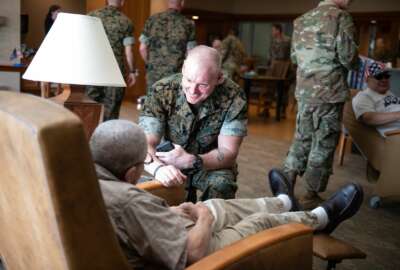Hubbard Radio Washington DC, LLC. All rights reserved. This website is not intended for users located within the European Economic Area.
Report card shows shortcomings in how DoD oversees intelligence
The Defense Department operates a slew of intelligence activities and programs. It even has a senior intelligence oversight official, who has come up with more
The Defense Department operates a slew of intelligence activities and programs. It even has a senior intelligence oversight official, who has come up with more than 100 recommendations over the last five years. But the Government Accountability Office (GAO) has some recommendations of its own for the oversight official. The Federal Drive with Tom Temin got the details from GAO’s Director of Defense Capabilities and Management, Alissa Czyz.
Interview Transcript:
Tom Temin So we have oversight of overseers here. You might say, with respect to the defense intelligence activities and just sort out for us what activities belong to the Defense Department in the gigantic intelligence apparatus.
Alissa Czyz The Department of Defense oversees 26 components that do intelligence or intelligence related activities. This is like National Security Agency. The military services each have their own intelligence department’s director of intelligence. Those types of things. This is not the broader CIA, FBI, the broader intelligence community. So, DoD has its own intelligence components.
Tom Temin Right. So, it’s a wonder they only had a couple of hundred recommendations for all of these 26 activities. But what were you looking at here to see whether those capabilities were responding to the Defense Department’s own overseer or whether the overseer was overseeing properly?
Alissa Czyz Right. It’s what you said at the beginning, Tom. So, we were asked to look at the roles and responsibilities of the DoD senior intelligence oversight official, or they call it SIO for short, of course, because DoD has lots of acronyms. So, this office is responsible for conducting oversight of those 26 components within the Department of Defense that do intelligence or intelligence related activities, right. They want to make sure that they’re following proper policies and procedures. They’re following the letter of the law. You’re carrying out those activities in a way that is proper and professional. So, they have a very important responsibility. They work, you know, in tandem with other DoD offices that provide oversight, like the inspector general’s office and the general counsel, but they play an important role in overseeing these defense components.
Tom Temin And how big is the silo operation? I mean, like the defense IG’s office is a couple of thousand people.
Alissa Czyz Right? It’s a pretty small office, actually. It’s only, you know, a handful of individuals. And the senior intelligence oversight official who also has a direct line to the secretary of Defense if needed. So, they don’t have a lot of resources, but they do have a very important role to play, and they can kind of partner with other offices if needed. But what they’ve been doing over the last several years that’s really important for the Department of Defense, is doing these inspections of these DoD components that do intelligence or intelligence related activities. So, they’ve been going every 3 to 5 years out to different components, and they check and see if they’re making sure that they’re doing their intelligence activities in accordance with policies and procedures. And they’ve provided a lot of value in doing those inspections of the components. They’ve made recommendations hundreds, as you mentioned over the years, to these components. So, they’re small shop, but they have a lot of important responsibilities.
Tom Temin And just out of curiosity, when they make a visit to look at something invisible, which is the intellectual activity of gathering intelligence, that sounds like more of an interview situation. What is it they can audit and look at?
Alissa Czyz Right. So, they do look at the components, own policies and procedures, what types of activities they’ve been carrying out, what types of training they provide, their personnel. They do interviews as well. They have kind of a checklist of things that they look for when they go out and do these visits. And in addition to those inspections, they do their own training for those components and for others in DoD. So, they provide that important resource as well.
Tom Temin Yeah. The question is what they tell people they do at cocktail parties, I guess we’re speaking with Alissa Czyz. She’s director of defense capabilities and management at the Government Accountability Office. And you found some risks, though, that have been entailed, even though they are pretty diligent about conducting these activities. What are some of the risks you identified?
Alissa Czyz Yeah. So, as I mentioned, they have been very active in doing inspections of these defense components. Their work over a five-year period that we looked at resulted in almost 300 recommendations for improvements to those components. The issue that we found were a few things. One, that they were not tracking the status of those recommendations. So, I’m from GAO. We make a lot of recommendations to executive branch agencies, and we follow up on our recommendations. We ask those agencies how they have implemented those. And that’s a really important part of the process. Right. So, all of these hundreds of recommendations, they didn’t have a good process in place to track whether those prior recommendations had been implemented. That was one issue, and we made a recommendation to make sure that they were tracking the progress. And they could do that in a number of ways. Right. They could require the components to report on their progress. So, there are some kind of low resource ways that they could implement that. One of the other big issues that we found that was a risk where they have actually decided to halt doing these inspections of defense components. So, in 2020, they decided to give it away from this and instead do these, what they call topic assessments. So instead of going out to one component and conducting a thorough inspection of that component, they are looking at topic areas like counter drug analytics support for example. And so, they are looking at all of the components that play a role in that particular topic. So, they are kind of hitting a larger swath of components by doing these topic assessments. But as we pointed out their component individual inspections had resulted in hundreds of recommendations over the year. So, we did see a lot of risk in that decision to halt those. Sure. We got feedback from some of the components to that. We’re worried about that as well.
Tom Temin And did they halt them because of pandemic? Because they didn’t want to go see people in person or it was hard to travel.
Alissa Czyz They decided that doing these topic assessments would kind of get at a larger group of components at one time. And we see merit to that, definitely. But what we found was that they didn’t assess the risk of stopping those individual inspections. So really what happens by not doing those individual inspections is that DoD is relying on the component itself to inspect itself, right. Some of these components are pretty, you know, experienced and have the resources to do that oversight of themselves. Others, like Space Force, is pretty new. I mean, they don’t have the experience. And there’s also some question of, you know, having an independent office come in and do an evaluation can provide a lot of benefits, too. So, we made a recommendation that they assess the risks of stopping those inspections as they move toward these topic assessments.
Tom Temin And then you also found that when they do the topic assessments, they weren’t fully developed with respect to what it is they were going to find out about them, the criteria.
Alissa Czyz Right. So again, we’re GAO. Right. So, we have a lot of processes that we follow and such as the inspector general standards that we use to conduct our audits. And the IG does as well. And we found that the SIO did not have all of these standards in place. So, we identified 22 standards that were relevant to their topic assessments. These are things like having a quality control system in place, or making sure you’re documenting evidence, or making sure the folks that are doing the investigations don’t have a conflict of interest. Those types of things. So, we identified 22 standards that would be important for their work. They had implemented many of them, but not all of them. So, we made a recommendation. An example would be that one about the independence of investigators. They did not have a process in place to assure that their investigators were independent. So, we made that recommendation to implement all 22 standards as they adopt this topic assessment process and evaluate the risks of stopping the inspections.
Tom Temin Right. But you didn’t quite go as far as to say you should go back to doing those inspections.
Alissa Czyz I mean, they have the ability to start those inspections. And we also, you know, acknowledge that, you know, they want to make their own decisions on how they’re going to conduct their oversight. But, you know, a risk analysis we think is prudent, right. Those inspections provided a lot of benefit. So, taking a look at those, and if there are gaps that exist, by stopping those inspections, by doing some type of analysis like that, they could take steps to mitigate those risks.
Tom Temin And the SIO office generally agreed with what you came up with.
Alissa Czyz They did they agreed on the 22 standards, they thought, but maybe not all of them were applicable. We strongly believe that all of them are applicable. We actually operate under those standards. The IG does as well. They’re broad. They’re not overly prescriptive. So, we do reiterate that we think that they should adopt all of them. But they did generally agree with all of the recommendations.
Copyright © 2024 Federal News Network. All rights reserved. This website is not intended for users located within the European Economic Area.
Tom Temin
Tom Temin is host of the Federal Drive and has been providing insight on federal technology and management issues for more than 30 years.
Follow @tteminWFED
Related Stories
GAO blames staffing shortages for agencies’ failures to battle cyber attacks
Related Stories
-
DHS’ list of AI use cases found inaccurate, GAO says Artificial Intelligence
-
Money for DoD’s Armed Forces Retirement Homes running out, GAO says Federal Newscast





